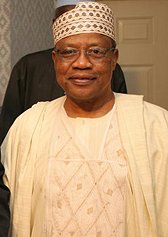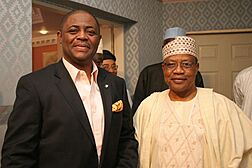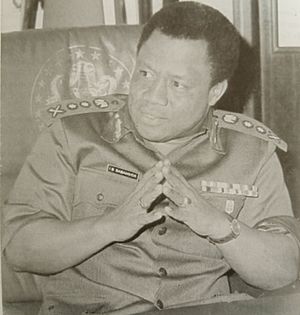Ibrahim Babangida facts for kids
Quick facts for kids
General
Ibrahim Babangida
|
|
|---|---|
 |
|
| 8th President of Nigeria | |
| In office 27 August 1985 – 26 August 1993 |
|
| Vice President |
|
| Preceded by | Muhammadu Buhari as Military Head of State of Nigeria |
| Succeeded by | Ernest Shonekan as Interim Head of State of Nigeria |
| Chief of Army Staff | |
| In office 1 January 1984 – 26 August 1985 |
|
| Preceded by | Mohammed Inuwa Wushishi |
| Succeeded by | Sani Abacha |
| Personal details | |
| Born | 17 August 1941 Minna, Northern Region, British Nigeria (now in Niger State, Nigeria) |
| Political party | Peoples Democratic Party |
| Spouse |
Maryam Babangida
(m. 1969; died 2009) |
| Children | 4 |
| Alma mater | Royal Armoured Centre |
| Occupation |
|
| Military service | |
| Allegiance | Nigeria |
| Branch/service | Nigerian Army |
| Years of service | 1962–1993 |
| Rank | General |
| Battles/wars | Nigerian Civil War |
Ibrahim Badamasi Babangida (born 17 August 1941) is a Nigerian general and politician. He served as the military president of Nigeria from 1985 to 1993. He came to power after a military takeover against Muhammadu Buhari. He later stepped down in 1993 during a period of political challenges in Nigeria.
He joined the Nigerian Army and fought in the Nigerian Civil War. He was also involved in several military takeovers in Nigeria. He rose to the rank of General and became the Commander-in-Chief of the Armed Forces. He led Nigeria for eight years as an unelected president. His time in power, often called the Babangida Era, saw many important changes and discussions in Nigeria.
During his rule, Nigeria became a stronger regional power in Africa. He helped with important agreements like the Abuja Treaty. Nigerian troops also took part in peacekeeping efforts in Liberia and Sierra Leone. His government also worked to improve Nigeria's economy. This included making some government-owned businesses private. His time as leader ended after a major election in 1993, which caused a lot of debate.
Contents
Early Life and Military Training
Ibrahim Babangida was born on 17 August 1941 in Minna, Nigeria. He went to primary school from 1950 to 1956. From 1957 to 1962, he attended Government College Bida. Many of his classmates later became important figures in Nigeria.
Babangida joined the Nigerian Army on 10 December 1962. He trained at the Nigerian Military Training College in Kaduna. He became a second lieutenant in the Royal Nigerian Army in September 1963. He also studied at the Indian Military Academy.
From 1964 to 1966, he was a Commanding Officer. He also attended a course in the United Kingdom. In 1966, he was in Kaduna during a military takeover. He later joined other officers in a counter-takeover that brought General Yakubu Gowon to power.
Military Career and the Civil War
Serving in the Civil War
When the Nigerian Civil War began, Babangida was called back to duty. He was part of the 1st Division. In 1968, he led the 44 Infantry Battalion, which fought in Biafra. In 1969, he was shot in the chest during a mission. He recovered in Lagos.
While recovering, he married Maryam Babangida on 6 September 1969. He returned to the war in December 1969. The war ended in January 1970, when the Biafran Army surrendered.
After the War
After the war, Babangida was promoted twice in 1970. He became an instructor at the Nigerian Defence Academy. He continued his military training in the United States. In 1973, he became commander of the 4 Reconnaissance Regiment. By 1975, he was the commander of the Nigerian Army Armoured Corps.
Colonel Babangida played a key role in the 1975 military takeover. He also helped stop another takeover attempt in 1976. This attempt led to the death of General Murtala Muhammed. Babangida bravely took back control of the Radio Nigeria station. He continued to attend advanced military courses.
Working at Army Headquarters
From 1981 to 1983, Babangida was the Director of Army Staff Duties and Plans. He was a main figure in the 1983 military takeover. This event ended the Second Nigerian Republic. After this, General Muhammadu Buhari became the military head of state. Babangida was promoted to Chief of Army Staff. He also became a member of the Supreme Military Council.
Becoming President in 1985
Planning the Takeover
After the 1983 takeover, General Babangida began planning to take over from General Muhammadu Buhari. The 1985 takeover was carefully planned. Babangida worked with trusted allies like Sani Abacha and Aliyu Mohammed Gusau. He also brought in younger officers he had taught.
The Takeover Happens
The takeover happened at midnight on 27 August 1985. Four Majors were tasked with arresting the head of state. By morning, the plotters had taken control of the government. Babangida was announced as the new commander-in-chief. He explained that General Buhari's government was "too rigid."
New Government Structure
Babangida became the President and Commander-in-Chief of the Armed Forces. He created the Armed Forces Ruling Council (AFRC). This council was the highest law-making body. He also reorganized the country's security agencies. He created the State Security Service (SSS), National Intelligence Agency (NIA), and Defence Intelligence Agency (DIA).
Babangida's Presidency
Soon after taking power, General Babangida set up the Nigerian Political Bureau in 1986. This group was created to discuss Nigeria's political future. It was asked to look at Nigeria's past political problems. The goal was to find ways to solve them. This was a very wide-ranging discussion in Nigerian history.
Between 1983 and 1985, Nigeria faced economic difficulties. In 1986, Babangida started the Structural Adjustment Program (SAP). This program aimed to improve Nigeria's economy. It had support from the International Monetary Fund (IMF) and the World Bank. In 1987, he launched the Mass Mobilization for Self Reliance, Social Justice and Economic Recovery (MAMSER). This program encouraged Nigerians to be more self-reliant and help the economy.
The SAP and MAMSER policies included:
- Making the farming sector more open. This meant getting rid of marketing boards and price controls.
- Selling off some government-owned businesses.
- Changing the value of the Nigerian naira to help exports.
- Making it easier for foreign companies to invest in Nigeria.
- Encouraging Nigerians to avoid waste and focus on economic recovery.
- Promoting honesty and fairness in public life.
These policies helped the Nigerian economy grow between 1986 and 1988. The export sector did very well. However, public sector workers and city dwellers saw their wages fall. There was also less money spent on public services. This led to some protests and unhappiness.
Babangida's government also worked on national buildings and roads. He completed the Third Mainland Bridge, which was the largest bridge in Africa at the time. His government also finished the Kaduna-Kano highway. He completed the Shiroro Hydroelectric Power Station. Other projects included the Toja Bridge in Kebbi and water treatment plants in Kano. He also created the Federal Road Safety Corps to manage roads better.
His administration also created new states in Nigeria. On 23 September 1987, he created Akwa Ibom State and Katsina State. On 27 August 1991, he created nine more states. This brought the total number of states in Nigeria to thirty. Babangida also increased the money states received from oil. His government moved the capital from Lagos to Abuja on 12 December 1991.
Babangida improved Nigeria's relationships with other countries. He spoke out against apartheid in South Africa. He also involved Nigerian troops in the Liberian Civil War. He hosted the Abuja Treaty, which led to the African Union. Nigeria also joined the Organisation of Islamic Cooperation in 1986. This was a group for Muslim countries. This decision was popular in Northern Nigeria, but some non-Muslims were concerned.
Challenges of the Third Republic
In 1989, Babangida began plans for Nigeria to return to civilian rule. He allowed political parties to form. He created a two-party system with the Social Democratic Party (SDP) and National Republican Convention (NRC). He encouraged all Nigerians to join one of these parties.
The 1992 parliamentary election took place as planned. The SDP won most seats in the National Assembly. However, on 7 August 1992, the first round of presidential primary elections was cancelled. In January 1993, Babangida changed the ruling military council. He also appointed Ernest Shonekan to lead a Transitional Council. This council was meant to prepare for a handover to an elected leader.
On 12 June 1993, the presidential election was held. Although the results were not officially announced, it was widely believed that Moshood Abiola of the SDP won. However, General Babangida later cancelled the election results. He said there were problems with the election. This decision led to many protests and political unrest, especially in the South West of Nigeria. Many people felt Babangida did not want to give up power to Abiola.
The ongoing crisis led to General Babangida's resignation in August 1993. Babangida set up an Interim National Government led by Ernest Shonekan. This interim government faced many challenges. The crisis continued for months. Eventually, General Sani Abacha took power.
Life After Presidency

After leaving office, Babangida continued to be an influential figure. He helped with Nigeria's return to democracy in 1998. He is one of the founders of the Peoples Democratic Party.
In August 2006, Babangida announced he would run for president in the 2007 Nigerian presidential election. He later withdrew his candidacy. In September 2010, he again declared his intention to run for president in the 2011 election. However, he was later advised by his close military associates to withdraw.
After his long-time rival, General Muhammadu Buhari, became president in 2015, Babangida kept a lower profile. In 2017, he had surgery. He is now considered an important elder statesman. He has called for younger leaders to take over in Nigeria. In February 2025, Babangida expressed regret for cancelling the 1993 elections. He stated that the elections were fair and that MKO Abiola had indeed won.
Personal Life
A movie about his life, titled Badamasi: Portrait of a General, was released in 2020. It covered his early life, his time in the Nigerian Civil War, and his presidency.
Family Life
Babangida was married to Maryam Babangida from 1969 until her passing in 2009. They had four children: Aisha, Muhammad, Aminu, and Halima. Maryam Babangida passed away on 27 December 2009.
Honours and Awards
Military Ranks Achieved
During his time in the military, Babangida achieved several ranks:
| Year | Insignia | Rank |
|---|---|---|
| 1963 | Second Lieutenant | |
| 1966 | Lieutenant | |
| 1968 | Captain | |
| 1970 | Major | |
| 1970 | Lieutenant Colonel | |
| 1973 | Colonel | |
| 1979 | Brigadier General | |
| 1983 | Major General | |
| 1987 | General |
National Awards
| Year | Country | Decoration | Presenter | Notes |
|---|---|---|---|---|
| 1983 | Nigeria | Commander of the Order of the Federal Republic (CFR); |
Shehu Shagari | Third highest national honour in Nigeria |
| Nigeria | Defence Service Medal (DSM); |
Nigerian Army | Military award | |
| Nigeria | Forces Services Star (FSS); |
Nigerian Army | Military award | |
| Nigeria | General Service Medal (GSM); |
Nigerian Army | Military award | |
| Nigeria | National Service Medal (NSM); |
Nigerian Army | Military award | |
| 1985 | Nigeria | Grand Commander of the Order of the Federal Republic (GCFR); |
Himself | Highest national honour in Nigeria |
International Awards
| Year | Country | Decoration | Presenter | Notes |
|---|---|---|---|---|
| 1988 | Yugoslavia | Order of the Yugoslav Great Star |
Raif Dizdarević | Highest decoration of Yugoslavia |
| 1989 | United Kingdom | Honorary Knight Grand Cross of the Order of the Bath (GCB) Military division; |
Elizabeth II | A high honour from the British system |
| 1989 | Zimbabwe | Freedom of the City of Harare | Robert Mugabe | A prestigious honour in Zimbabwe |
| 1990 | Equatorial Guinea | Grand Collar of the Order of the Independence | Teodoro Obiang Nguema Mbasogo | Highest national honour in Equatorial Guinea |
See also
 In Spanish: Ibrahim Babangida para niños
In Spanish: Ibrahim Babangida para niños
 | Janet Taylor Pickett |
 | Synthia Saint James |
 | Howardena Pindell |
 | Faith Ringgold |


